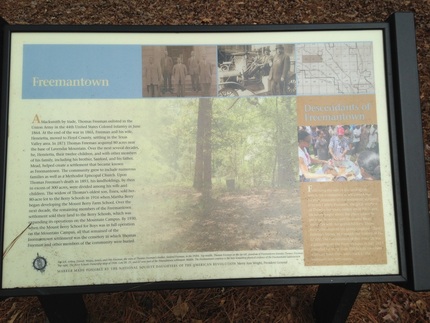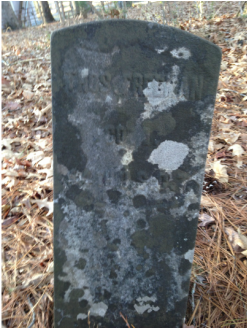|
Being fan of public radio and, obviously Georgia, I have taken an interest in the show On Second Thought with Celeste Headlee. The stories have specific ties to Georgia and do inspire some extra thought. Monday's show was no exception. A specific segment grabbed me by Gabrielle Ware. The segment featured the Gullah-Geechee people of coastal Georgia. Geechee is the more Georgian name, as the same people in South Carolina are referred to as Gullah. I'm including a link to the segment and I promise the few minutes it takes to listen are worth the time.  Historic marker placed by Berry College telling the story of Freemantown. Historic marker placed by Berry College telling the story of Freemantown. So the number is down to 48. The architecture, the language, the folklore, the community, all of it, is on the verge of disappearing forever. This is not acceptable. It's not acceptable to me because I see this as a uniquely Georgian culture. There is only one other state in the nation that has such people. This group represents so many elements that All the Biscuits in Georgia was founded to celebrate and preserve. It's history. It's traditional. It's community. It's agrarian. It's Southern. Most importantly, it's in danger. It is likely that my children will see the age in which living historians are hired and trained to interpret the Geechie way of life on Sapelo because the last of their culture will be swept from the Earth. But we live in a time when real Geechie people can interpret their culture for us right now. And if you heard the segment, you heard a specific concern is that the Geechie people are able and willing to do something themselves to preserve their buildings and more. I keep thinking about our way of life. These days it seems to be passed down from commercial to commercial. Our arts are nothing more than passing fads. Everything is disposable. Then there's the rat race. And in the midst of that it is easy to find ourselves thinking of the Geechies as backwards. Living in small old houses, weaving grass baskets, speaking some weird language no one 10 miles inland can understand. But listen to the story. "I'm 86 years old. Grandmother lived to be 105..." How many rat-racers are living to be 105? How many rat-racers are 86, still in possession of their faculties and leading productive lives? Maybe we need to learn a thing or two from this culture about how to live and how to thrive. But this story hits close to home. A few weeks ago, my sons and I set out to find a landmark. The remnants of a community populated by freed slaves. In 1871, Thomas Freeman, a freed slave and Civil War veteran of the USCT, acquired 80 acres near Lavender Mountain in Floyd County. He started a community for freed slaves that thrived. There were homes, businesses, a church. When Thomas Freeman died in 1893 he owned over 300 acres. And in the interest of full disclosure, I use a variation of Thomas Freeman's sister Martha's cornbread recipe.  The grave marker of Thomas Freeman, USCT veteran & founder of Freemantown. The grave marker of Thomas Freeman, USCT veteran & founder of Freemantown. Stories live on through the descendants of the residents and a historical marker placed by Berry College memorializes the community that began to break up around 1916. By 1930, the only product of the community's labor remaining was the small cemetery that held several of the former residents. Today that cemetery is hidden away, tucked in a corner behind a barn. The various stones, mossy and mostly unmarked, are all that remains of a community that likely resembled Hog Hammock. No structures remain. The people have all left in search of better opportunity. Larger cities have siphoned off the life blood that sustained Freemantown's very existence. "Opportunity", in all it's various forms, was the death knell of a unique culture. And we are on the verge of watching that same disaster befall Sapelo Island. What a shame that would be.
3 Comments
Sam Burnham
2/28/2015 03:52:53 am
I'd be lacking some decency if I did not give Dr. Julie House credit for helping us locate the Freemantown Cemetery. Without some tips from her, we would still have no idea where it is.
Reply
Geneva Freeman Rayford
6/7/2016 04:57:38 pm
I was so pleased to read the information on Freemantown. My grandfather John Henry Freeman was from Freemantown. He was the son of Berry and Sally May Freeman. They left fleeing for their life, sometime in 1920s. Ended up eventually in Uniontown, Pa. My grandfather finally settled in Warren, OH.
Reply
Sam
6/7/2016 11:41:13 pm
Geneva, thanks so much for the comment & story. Such a connection helps put names and, at least metaphorically, faces on the story we were telling. I makes the place real to readers and helps us connect with a place and time that is gone from our sight.
Reply
Leave a Reply. |
Sam B.Historian, self-proclaimed gentleman, agrarian-at-heart, & curator extraordinaire Social MediaCategories
All
Archives
November 2022
|




 RSS Feed
RSS Feed
